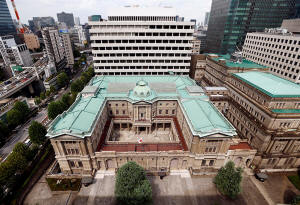Japan on cusp of ending negative interest rates, chance of March BOJ
exit heightens
 Send a link to a friend
Send a link to a friend
 [March 15, 2024] By
Leika Kihara [March 15, 2024] By
Leika Kihara
TOKYO (Reuters) - Bigger-than-expected pay hikes by major Japanese firms
have significantly heightened the chance the central bank will end eight
years of negative interest rate policy next week, marking a landmark
shift away from its huge stimulus programme.
Internal preparations for an exit have been in the works since Kazuo
Ueda took office as BOJ governor in April last year, and were mostly
done by year-end, say sources familiar with the bank's thinking.
BOJ officials, including Ueda, have recently stressed the timing of a
shift away from negative rates would depend on the outcome of this
year's annual wage negotiations between workers and employers.
Annual labour talks with major firms ended up with pay raises of 5.28%,
the country's largest union group said on Friday, the highest in 33
years and far exceeding private forecasts for a hike of around 4.5%.
The results, which heightened hopes that rising pay will revive stagnant
household spending, cemented the chance of an exit from negative rates
at the BOJ's two-day meeting ending on Tuesday, analysts say.
"Given the stronger-than-expected wage talk outcome, the BOJ will likely
ditch negative rates and yield curve control next week," said veteran
BOJ watcher Naomi Muguruma, chief bond strategist at Mitsubishi UFJ
Morgan Stanley Securities.

"The BOJ could have waited until April if the wage talk outcome wasn't
this strong. But with markets already pricing in the chance of an exit,
it would actually be a surprise if the bank forgoes ditching negative
rates next week," she said.
If the nine-member board believes the conditions are right, the BOJ will
set the overnight call rate as its new target and guide it in a range of
0-0.1% by paying 0.1% interest on excess reserves financial institutions
park with the central bank.
Upon exiting its negative rate policy, the BOJ will also ditch its bond
yield control and discontinue purchases of risky assets such as
exchange-traded funds (ETF), sources have told Reuters, putting a formal
end to the radical monetary experiment of former Governor Haruhiko
Kuroda in place since 2013.
[to top of second column] |

Japanese national flag is hoisted atop the headquarters of Bank of
Japan in Tokyo, Japan September 20, 2023. REUTERS/Issei Kato/File
Photo/File Photo

A poll taken in March showed 35% of economists expected the BOJ to
end negative rates at the two-day meeting ending on Tuesday, up from
the previous month's 7% but still below 62% projecting such action
at its subsequent meeting on April 25-26.
With an end to negative rates seen as nearly a done deal, the
market's attention is shifting to any clues the BOJ could give on
the pace of any interest rate hikes thereafter.
Ueda has said the central bank will maintain accommodative monetary
conditions even after ending negative rates, and avoid causing any
"discontinuity" from the current ultra-loose policy given
uncertainty over the economic outlook.
Any guidance on the future policy path that the BOJ could offer upon
ending negative rates will likely be in line with such comments,
sources have told Reuters.
Under previous Governor Kuroda, the BOJ deployed a huge asset-buying
programme in 2013 aimed at reflating growth and firing up inflation
to its 2% inflation target in roughly two years.
The central bank introduced negative rates and yield curve control (YCC)
in 2016 as tepid inflation forced it to tweak its stimulus programme
to a more sustainable one.
However, last year, as the yen's sharp falls pushed up the cost of
imports and heightened public criticism over the cost of Japan's
ultra-low interest rates, the BOJ tweaked YCC to relax its grip on
long-term rates.
An end to negative short-term rates would be Japan's first interest
rate hike since 2007.
(Reporting by Leika Kihara; Additional reporting by Yoshifumi
Takemoto, Tetsushi Kajimoto, Takaya Yamaguchi and Takahiko Wada;
Editing by Sam Holmes and Kim Coghill)
[© 2024 Thomson Reuters. All rights
reserved.]
This material may not be published,
broadcast, rewritten or redistributed.
Thompson Reuters is solely responsible for this content. |